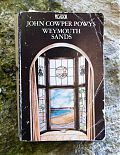
John Cowper Powys
Weymouth Sands
Oh, how odd it was to read John Cowper Powys’ Weymouth Sands while travelling in Southeast Asia. With its phalanx of characters and jumble of subplots—for is there even A Plot?—one risks sheer passages to the lack of full engrossment. I may have lost some here and there, in hammocks or out train windows, but let them be passages well lost, let them drift off to their place in the Inanimate.
…between St. Alban’s Head, the White Nose, the Nothe, Chesil Beach, the Breakwater, the Town Bridge, the White Horse, Hardy’s Monument, King George’s Statue, St. John’s Spire, the Jubilee Clock, and this perpetual crying of sea-gulls and advancing and retreating of sea-tides, there might have arisen, in their long confederacy, a brooding patience, resembling that of an organic Being…
It is in Weymouth Sands more than any other book by John Cowper Powys I have so far read, that has given this “patience” the widest reign. Into this “brooding patience” all action seems to fizzle out, like the characters, their relationships, their unhappinesses. It is something I have come to think of as lingering in the air around and sometimes sharing the air within all things. To believe John Cowper Powys, this “energy” is everywhere, certain places, by dint of their popularity, are heavier than others.
It is hard to suppose that any strip of planetary surface, even over which the sea-tides advance and recede, can be so totally oblivious to the shifting impressions of our race’s tragic comedy as to retain no trace, no memory, no memorial, of words that have once been spoken.
Out of all John Cowper Powys’ varied philosophies, this is the one that stays with me the longest. In it there is something so truthful to me—whether it is a hopefulness or a desire for more than our banal landscape, I don’t know. In it is a reason for keener observation, an invocation to the mysterious and a reverence for everything; there is also an immortality for words and thoughts as much as deeds.
Also in Weymouth Sands more than his other books, there is an over-brimming of relationships. Usually there is at least one, but here every other character gets paired up true to form: old guy and young girl. If this wasn’t clear enough in Wolf Solent, in Weymouth Sands the reader is given a very filling dose. Though it is only Sylvanus Cobbald who has a preoccupation with virgins, and what happens when one beds with them. No, he’s not after bleeding hymens but something greater:
And as he now held this slender young being in his arms,… he began to use her young warmth,… to strengthen his colloquy with the mystery of the cosmos.
Virgins hold the secret of the Absolute! Or, they at least allow guys to get closer: just hold a sleeping sylph in your arms to unravel the world’s secrets! Sylvanus is not the only one with young saplings and white limbs on his mind; though the other men’s attractions are merely accidental. Take poor poor Magnus Muir and his tragic longing for young and beautiful Curly, whose beauty begins to lead its own existence. To Curly this ruminative man is extremely ill-suited. Yet how is that enough to stop his love?
Magnus is not the only unhappy one in Weymouth Sands. Unhappiness dominates much of this book; most every character has at least one melancholy to brood about. But the text is not forlorn, which brings me back to the Inanimate. No one makes any large effort to “fix” their problems, leaving the ending relatively incomplete. Instead, these people simply go with their problems until they are able to let go, more thoughts and words for the Inanimate.
This is not an optimistic outlook though neither is it pessimistic. There is much in John Cowper Powys’ eccentric writings and philosophies that is more real than the most studied writer, scientist, person. As a writer he has the ability to let himself go, a quality in life that some are severely lacking. John Cowper Powys is fixed in my imagination—and my soul, perhaps—as a writer of boundless inspirations.
Commentary for Weymouth Sands
· · · · · · · · · · · · · · · · · · · ·
1 On Sunday 31 July 2011 Vincent wrote:
In fact your place of exile when you encountered the book had a special appropriateness. JCP wrote it entirely while he was living in the States.
I wrote a piece on this wonderful novel too, drawing out the story of one of its minor characters: Peg Frampton. http://www.ian.mulder.clara.net/peg.htm